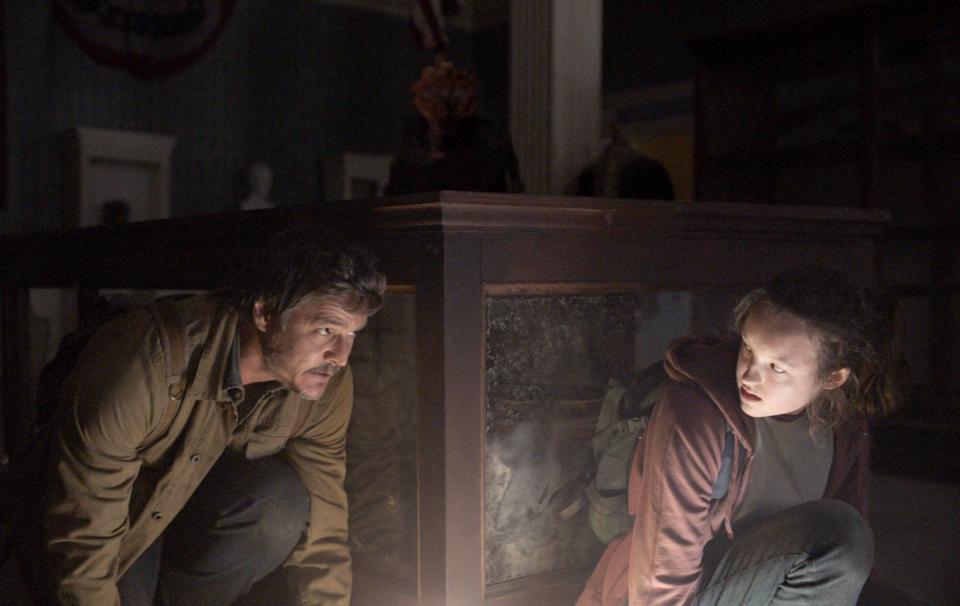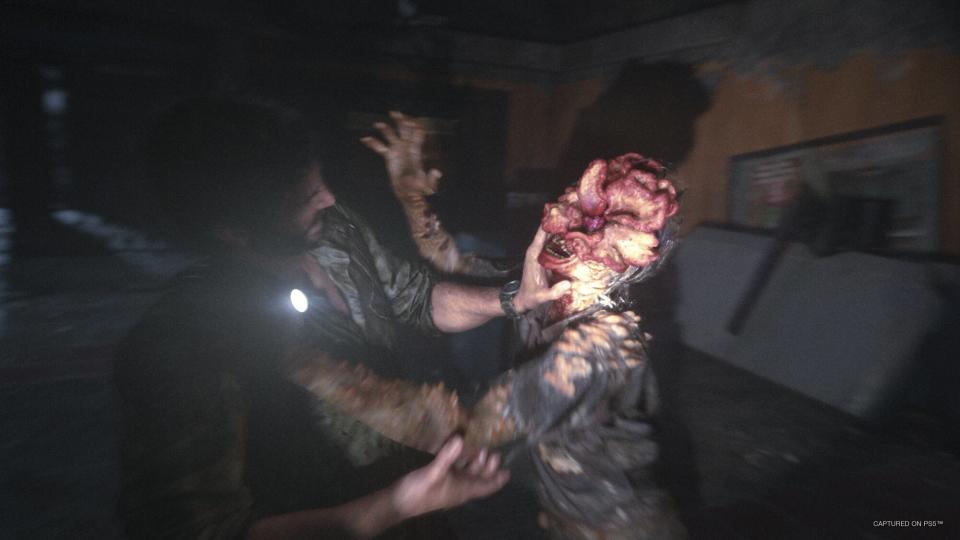The lasting legacy of The Last of Us : Game makers explain the hype around HBO series
Watching the 46 seconds of footage from HBO's upcoming The Last of Us elicited the same feeling Shaun Escayg got when he first walked into gaming studio Naughty Dog in 2012.
Escayg was being recruited by the developers who brought us Uncharted and now wanted to make a post-apocalyptic sci-fi adventure, about a man and a young girl thrust together by circumstance as they trek across what's left of a pandemic-ravaged America. Escayg found himself in the same room as Bruce Straley, the game director behind this new project, and Neil Druckmann, the creative director. He was immediately drawn into the story.
"The theme of, do the ends justify the means? This exploration of both the beauty and darkness of unconditional love," Escayg muses in an interview with EW. "It was groundbreaking. It was almost like this feeling of lightning in a bottle."
"Lightning in a bottle" is how he describes the first footage of HBO's TV adaptation that arrived during the premiere of House of the Dragon on Aug. 21. It felt like this game that he worked on, that has endured for nearly 10 years since launching in 2013, was again starting a new frontier. "This story is crossing mediums and expanding, and potentially reaching a larger audience that will draw, in turn, more and more fans to the franchise," he says. "And for us, it's getting to relive it."
Escayg has relived the glory days of The Last of Us more than most. The same goes for Matthew Gallant, who worked on the original as a game designer before landing an elevated position as game director on The Last of Us Part I, a built-from-the-ground-up remake of the original award-winning game that breathes new life into the story. Escayg served as creative director on this project, which dropped today on Playstation 5. They are also two of the few who can truly understand why The Last of Us has endured for as long as it has, and why it's that legacy that is fueling the hype around the HBO series.
"It gave me goosebumps to watch the [HBO] trailer, as little footage as that was," Gallant says. "I felt like I was wanting to watch it over and over again, and catch all the little details."
Game changing

HBO Pedro Pascal and Bella Ramsey debut as Joel and Ellie in HBO's 'The Last of Us'
Those who haven't played The Last of Us or consumed any of its successors — the remastered version, the Last of Us Part II sequel, or the accompanying comics — may be drawn to HBO's upcoming drama through its stars: Game of Thrones veterans Pedro Pascal and Bella Ramsey. They never shared the screen when they appeared as Prince Oberyn Martell of Dorne and Lady Lyanna Mormont on that fantasy series, but now they're stuck together in The Last of Us as Joel and Ellie.
The drama, premiering next year, introduces Joel as a hardened survivor who lives in an oppressively militarized quarantine zone, one of the last human settlements in the United States. This is years after a fungal plague laid waste to humanity, transforming those infected into zombified monstrosities. Joel is doing shady jobs with his friend, Tess (Anna Torv), to get by until he's approached by Marlene (Merle Dandridge), the leader in these parts of a resistance group called the Fireflies. She has a task for Joel: smuggle Ellie, a 14-year-old young girl, out of the quarantine zone and pass her off to their contacts on the outside. Don't ask questions. That's the job. Take it or leave it. What begins as a seemingly small mission sets Joel and Ellie on a harsh odyssey across the country, with both having to rely on each other for survival.
Those who have played the video game know full well the pressures bearing down on the shoulders of the adaptation, but also the excitement for what it could pull off if done well. The Last of Us sold a stunning 1.3 million units within its first three days in 2013, the biggest gaming launch of the year at that time. Three weeks later, it became the biggest launch of an original game since 2011. It proceeded to break sales records and win accolades, including awards for Joel and Ellie voice actors Troy Baker and Ashley Johnson.
Why was this game having such an immediate impact? It's clear to both Escayg and Gallant.
"Bruce and Neil had a vision. We're not gonna do the thing that every other video game was doing in 2012: You do a bunch of fighting, and then you watch a movie, and then you do a bunch of fighting, and then you watch a movie," Gallant recalls of his early meetings with the creative team. "When you're in control of the character, we call it 'on the stick.' They were like, 'When you're on the stick, everything that's happening there is telling the story. And, yeah, there's gonna be cinematics. You're gonna watch a scene play out with these characters interacting, but then you're gonna go back into gameplay and you're also gonna be getting the story there.'"
Everything about the game was telling the story. Players would pick up pieces of it through the combat (how Joel fights becomes a very telling sign of his character) and through the environment (the note found at the foot of a corpse off in the corner would tell you more about how the world came to be). It was also highly cinematic.
Escayg, having worked as an animator at ILM on 2011's Transformers: Dark of the Moon, hadn't been involved with a video game before The Last of Us. He remembers complaining about the cinematography to Druckmann, who told him to make it better. "It was a challenge of, how do you create this experience that feels like you're playing out the movie version?" he says. "You knew something was special, even if you didn't know how far it was gonna go. You just knew you were on the cusp of something."
"I think that had a ripple effect across the game industry," Gallant adds. "So many other studios now picked up that torch and that approach of saying, 'No, the story is not just what happens in the cut scenes between video games. The whole thing is the story.' Trying to align every system and every decision to support that storytelling."
All the feels

Naughty Dog Joel fights off a clicker in 'The Last of Us'
Escayg and Gallant found themselves in a similar place as the creators of HBO's The Last of Us. (Craig Mazin of Chernobyl co-created the series and executive produces with Druckmann.) They have to put their own marks on one of the most beloved gaming franchises of all time. The Last of Us Part I remakes the original game using current technology designed for the PlayStation 5, including enhanced photo-real visuals, lighting, combat, audio, and more.
"It's absolutely a lot of pressure we put on ourselves as a team to approaching arguably one of the greatest games ever made and then trying to make that better," Escayg remarks. "Just the weight of that sat with us and still sits with us today. We feel this intense pressure to do right by the original team that did this work and to elevate the franchise, 'cause we have a deep love for it, as well."
Ultimately, they wanted to preserve the core experience gamers had playing The Last of Us in 2013, which relied heavily on a core character study and questions of morality prompted by the story: How far will a person go to survive and protect those they love? "One of the things that's true about great stories is that they hit you differently at different stages of your life," Gallant notes. "I found that to be true of The Last of Us."
Making The Last of Us Part I, Gallant was struck harder by the dynamic between Joel and Ellie since becoming a father himself in the years since the original game released. "The journey of The Last of Us game is the journey of how Ellie and Joel initially distrust each other, hate each other, to some extent don't get along, and how through the events of the story they grow close to rely on each other until they develop almost a father-daughter relationship."
Gallant says the emotional beats of the game all feel heightened now because "of the fidelity of the characters and the cinematic improvements," but it's his own connection to the story that resonates most. The same goes for Escayg, who relates to brothers Henry and Sam, two figures Joel and Ellie encounter on their journey. (Lamar Johnson will play Henry and Keivonn Woodard will play Sam in the HBO drama.)
"That older brother, younger brother relationship, there's a lot of conflict in there," he says. "Kind of like a dad, but not. When a younger brother is growing older, they start to challenge you. 'You're not my dad.' That's the dynamic where they're in the toy store, for example." The toy store scene occurs fairly soon after Joel and Ellie meet them in the game. Sam finds a robot figure in an abandoned toy shop, but Henry reminds them of their rule to only take what they can carry. "These are very relatable moments that I've had with my younger brother in different contexts."
It's these same kind of connections that drew so many people to The Last of Us and, presumably, what made Hollywood try to adapt the game for so many years. Sony tried to make the game into a movie back in 2014, but that never got off the ground. It was only in 2020 that HBO announced they were officially moving ahead with the TV series.
It's clearly a big focus for HBO. When the network introduced the footage in its big "coming to HBO Max" montage that aired just before the premiere of its flagship series, House of the Dragon, The Last of Us was the centerpiece. The footage kicked off with a shot of Pascal's Joel and Ramsey's Ellie walking across a snow-covered bridge, guns at the ready.
Even though neither are a part of the show's development, both Escayg and Gallant were struck by the authenticity of the teaser footage, down to specific clothes the actors wore.
"They really, really care about the art direction," Gallant says. "That two-second clip of the infected embedded in the wall. That looks like it's right out of the game. The way the characters' outfits look. The way certain lines are delivered in that trailer. That's often not true in video game adaptations. They often take really big creative license with the original franchise. This looks like it's just gonna be so authentic to the original games. And as someone who loves the original games, I'm so excited to see that being explored in a different medium."
Related content:

